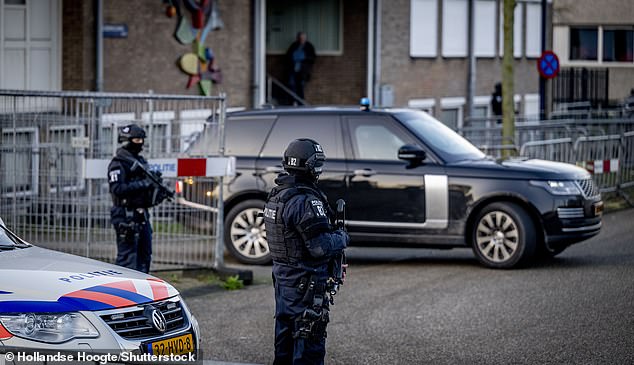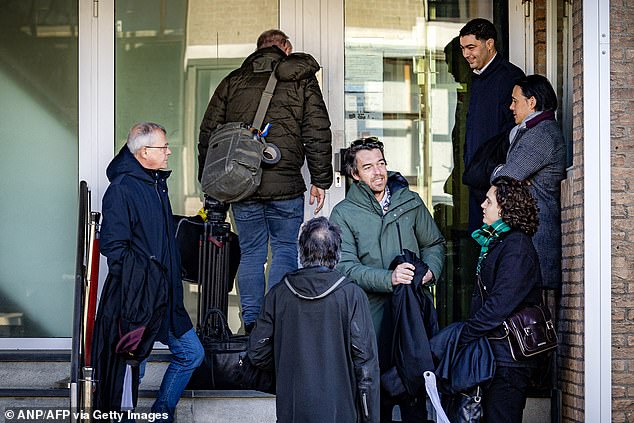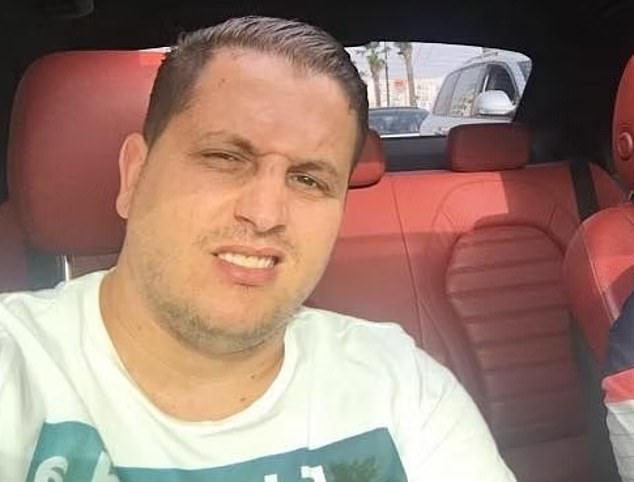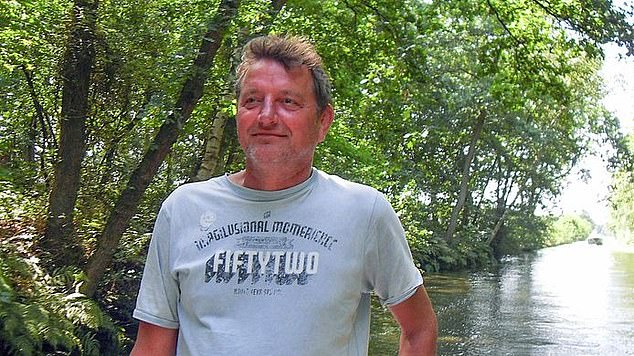‘If you talk, you die’: Chilling rule imposed by Europe’s most feared drug lord Ridouan Taghi to terrify traitors as he receives a life sentence for leading a ‘well-oiled killing machine’ gang during the Dutch narco-war who knew beheadings and revenge killings
Europe’s ‘most feared drug lord’ has been sentenced to life imprisonment by a Dutch court following an ultra-high security mega-trial against the mafia.
The court today convicted 17 suspects in the long-running trial of an underworld gang that planned a series of murders, known as the Marengo Trial.
Judges handed life sentences to three of them, including the gang’s ‘undisputed leader’, Ridouan Taghi, once the Netherlands’ most wanted fugitive, in a courthouse known as the ‘Bunker’.
The trial and three more murders linked to the case have captivated and roiled the Netherlands, exposing the deadly reality of the country’s drug-fueled criminal underworld.
The court heard that Taghi – said to be Europe’s most feared and powerful drug lord – had a simple rule: ‘If you talk, you die.’
He rose to cartel boss by smuggling record amounts of cocaine into European ports, worth a reported $1 billion.
Prosecutors have pushed for life sentences for Taghi, 46, who has pleaded not guilty, and five of his co-defendants for their involvement in what they called a “well-oiled killing machine.”
Ridouan Taghi, once the most wanted fugitive in the Netherlands, has been jailed for life

A secured car arrives at the extra-secure court on Tuesday for the verdict in the Marengo criminal case in Amsterdam

Lawyers arrive at the extra-secure court on Tuesday for the verdict in the Marengo criminal case in Amsterdam
Taghi and several co-defendants were not present on the last day of their trial in a closely guarded courthouse on the outskirts of the Dutch capital.
Heavily armed police officers dressed in bulletproof vests, helmets and ski masks patrolled the streets around the court as cars carrying some of the defendants pulled into an underground parking lot for the hearing.
Taghi was convicted of five murder counts, including that of a man named Hakim Changachi, who was shot in Utrecht in 2017 in what prosecutors said was a case of mistaken identity.
“Taghi ordered the attack” on another man who lived in the same apartment building as Changachi, the judge said.
“Taghi was responsible for the mistake,” the judge added.
“He decided who would be killed and spared no one,” the chairman said. ‘The amount of suffering that Taghi has caused the victims and their loved ones is hardly imaginable.’
The court ruled that Taghi also used extreme violence to intimidate enemies and potential police informants.
‘He thus prevented people from cooperating with the police. Such terror has a disruptive effect on society,” he said. Court officials asked the media not to name the judges for security reasons.
At least three people directly linked to the six-year mega-trial, named after a judicial code word for the operation, have been killed.
The brother of a key witness, identified only as Nabil B., his lawyer and a journalist who acted as a confidant for the witness have all been murdered in the nearly six years since the trial opened.
Lawyer Derk Wiersum was shot outside his home in Amsterdam on September 18, 2019. Two men have been convicted of murder.
Journalist Peter R. de Vries was also shot in Amsterdam as he walked to his car from a television studio on July 6, 2021. He died nine days later from his injuries. Prosecutors have sought life sentences for three of the suspects in his murder.
De Vries acted as a confidante of Nabil B. at the time of his murder and had previously said that he was on Taghi’s hit list.
At one point during the brutal narco battles, a severed head was placed outside a meeting place used by rivals for intimidation.
The wave of murders gave the already grim trial “a pitch-black edge,” the chairman told a packed courtroom.

Taghi was convicted of five murder counts, including that of a man named Hakim Changachi (pictured), who was shot in Utrecht in 2017 in what prosecutors said was a case of mistaken identity.

Ronald Bakker, who was shot dead outside his home after the gang suspected he had cooperated with the police

Naima Jilal, who is probably also one of Taghi’s victims
The judge regretted that De Vries ‘will never sit on the press bench again’ at the court.
King Willem-Alexander called De Vries’ shooting ‘an attack on journalism, the cornerstone of our constitutional state and therefore also an attack on the rule of law.’
Taghi was one of the most wanted men in the Netherlands until he was arrested in Dubai in 2019 and flown home to stand trial. He and other suspects were accused of involvement in six murders and four attempted murders.
Despite being held in an ultra-security prison, prosecutors say he continued to pull strings and send secret messages to outside accomplices.
Taghi’s gang was nicknamed the ‘Mocro Mafia’ because its members are mainly of Moroccan and Antillean descent.
The Public Prosecution Service stated that the suspects were part of a ‘completely unscrupulous murder organization that murdered people carelessly and indifferently.’
They said the consequences of the multiple killings were “not only felt by the surviving relatives, but also had wider consequences for society.”
Lawyers for the suspects had requested an acquittal. The court rejected the defense’s arguments that the trial was unfair and that the suspects had already been convicted by the court of public opinion.
The court ruled that Nabil B.’s testimony was reliable and could be used as evidence. The witness himself was also tried and was sentenced to 10 years, a reduced sentence due to his cooperation.
Other suspects received sentences ranging from life imprisonment to just under two years behind bars.
Judges said the witness’s testimony led to convictions in five murders that would otherwise have gone unsolved.
But after reducing his sentence, the chairman added that he “will have to live with the reality that you will always have to look over your shoulder.”
The court also accepted decoded telephone messages as evidence in their verdicts. Lawyers for the suspects had argued that the evidence could not be used in the trial.
Convictions and sentences can be appealed.
